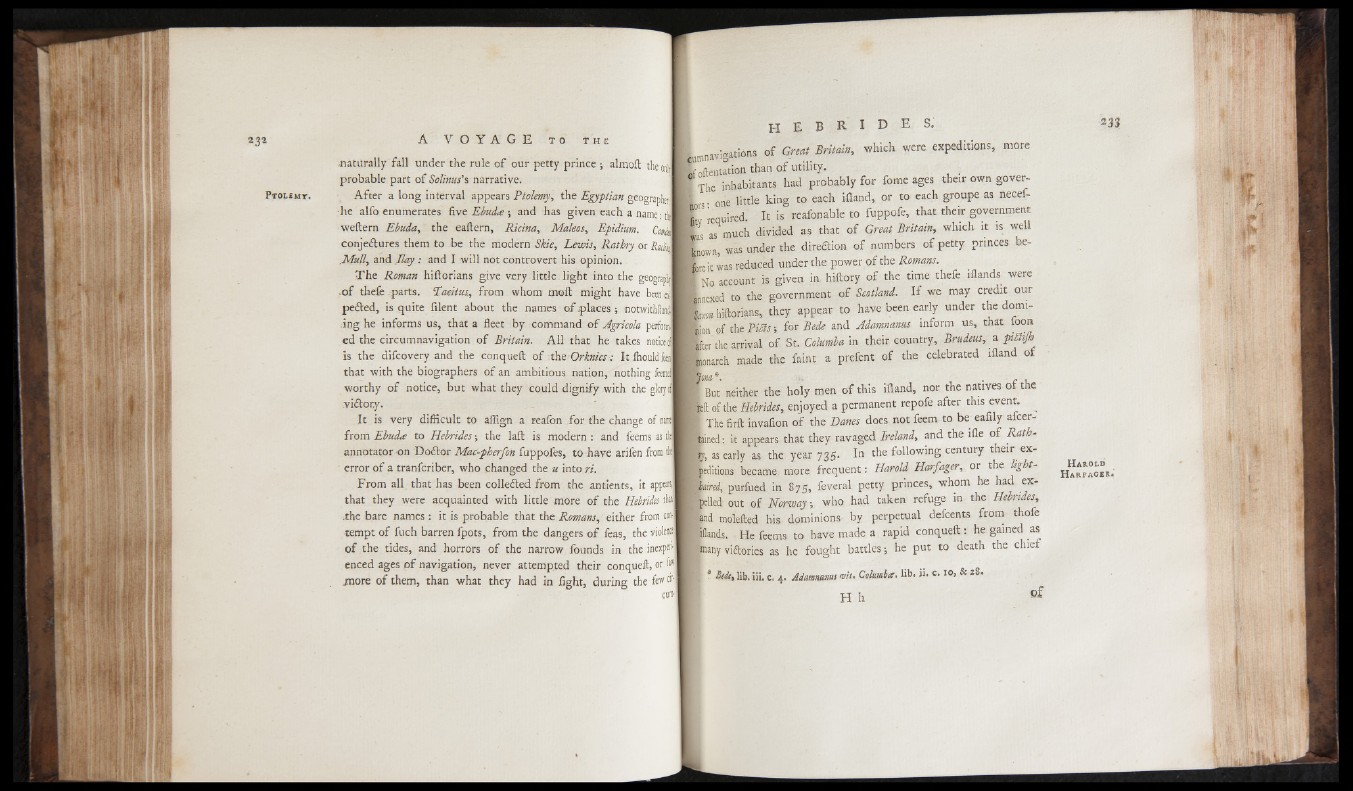
P t o l e m y -.
¿naturally fall under the rule of our petty prince; almoft the oj
probable part of Solims’s narrative.
After a long interval appears Ptolemy, the Egyptian geographer!
he alfo enumerates five Ebuda ; and has given each a name J
weftern Ebuda, the eaftern, Ricina, Maleos, Epidium. Cam
conjeitures them to be the modern Skie, Lewis, Rathry or RM
.Mull, and Hay: and I will not controvert his opinion.
The Roman hiftorians give very little light into the geograplj
.of thefe parts. Taeitus, from whom moil might have been tij
peited, is quite filent about the names o f places ; notwithliJ
,ing he informs us, that a fleet by command o f Agricola perform]
ed the circumnavigation o f Britain. All that he takes notice«
is the difcovery and the conqueft of ¿the Orknies: It ihould leetj
that with the biographers of an ambitious nation, nothing feemel
worthy of notice, but what they could dignify with the glory«
vidtory.
It is very difficult to affign a reafon .for the change of naffl
from Ebuda to Hebrides; the laft is modern : and feems as M
annotator -on Dodtor Mac-pherfon fuppofes, to have arifen from ¡q
error o f a tranfcriber, who changed the u into ri.
From all that has been colleiiled from the antients, it appears]
that they were acquainted with little more of the Hebrides ttaj
.the bare names : it is probable that the Romans, either from ®]
tempt of fuch barren fpots, from the dangers of feas, the violent!]
o f the tides, and horrors o f the narrow founds in the inexpen-j
enced ages o f navigation, never attempted their conqueft, or M
more of them, than what they had in fight, during the few <¿1
cum
I navigations o f Great Britain, w h ich were e xp ed ition s , more
S en ta tio n than of utility.
The inhabitants had probably for fome ages their own gover-
I one little king to each ifland, or to each groupe as neceff°
w required. It is reafonable to fuppofe, that their government
E as much d ivided as th a t o f Great Britain, w h ich it is w e ll
|nown, was under the diredlion o f n umbers o f p e t ty p r ince s b e-
I £oreit Was reduced under the p ow e r o f the Romans.
I No account is g iv e n in h ifto ry o f th e tim e thefe iflands were
Itlnnexed to the g o v e rnm en t o f Scotland. I f w e may c red it o u r
L a hiftorians, th e y ap p ear to have been ea r ly u n de r th e d om i-
I lion of the P ills ; fo r Bede and Adamnanus info rm u s , th a t loon
lifer the arrival o f S t. Columba in th eir c o u n try , Brudeus, a pitlijh
R o n a rch made the fa in t a prefent o f th e ce leb ra ted iflan d o f
B « * - r
But neither th e h o ly men o f th is iflan d , nor th e nativ es o f the
B e i t of the Hebrides, enjoyed a permanent repofe a fte r this e v en t, k
i The firft invafion o f th e Danes does n o t feem to b e e a f ily afcer-
tamed: it appears th a t th e y ra v a g ed Ireland, and th e ifle o f Rath-
B j , as early as the y e a r 735. In the fo llow in g c en tu ry th e ir e x -
^■ieditions became, more f r e q u e n t : Harold Harfager, o r th e light
Wtmti, purfued in 875, feveral p e tty p r in c e s , w h om he h ad e x -
pelled out o f Norway; w h o had ta k en re fu g e in- th e Hebrides,
U n i molefted his dominions b y p e rp e tu a l defcents from thofe
K a n d s . H e feems to h a v e made a rapid c o n q u e f t : he ga ined as
■many viftories as he fo u g h t b a t t le s ; he p u t to dea th th e c h ie f
f r :
m
H a h o lo
H a RFAG£R*
* A * , lib. ill. c. 4. Adamnanus nit. Ctlumha. lib. ii. «. 10, & 28.
H h o f